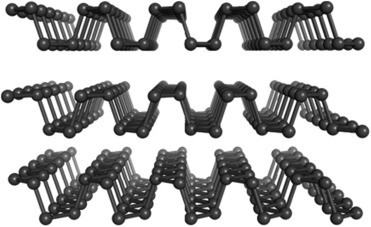
The discovery could have relevance for electronics and quantum technologies, according to research leader Prof Irina Grigorieva.
Phosphorene is an atomically-thick two-dimensional material similar to graphene but composed of phosphorus atoms. It is related to black phosphorus, an allotropic form of phosphorus, in the same way that graphene is related to graphite. Black phosphorus has been the focus of much research in recent years because it has interesting optical and electronic properties.
The new research aims to investigate the limits of superconductivity, and specifically whether single atom thick materials can become superconductors. Although evidence of this was discovered around a decade ago, it has not been clear whether isolated layers could display this property. Grigorieva’s team used a technique called intercalation to enrich the phosphorene layers with electrons; this has produced superconductivity in bulk materials in previous experiments.
The technique involved coating phosphorene layers in black phosphorus that had been "doped” with different alkali metal atoms with more free electrons than phosphorus that could be donated to the single atom thick layer. As they explain in Nature Communications, the team found that it didn't matter whether they used lithium, potassium, rubidium, caesium or calcium as the dopant – as long as extra electrons are available, the phosphorene was transformed into the same superconductor with identical properties. They believe that the metal atoms act as "charge reservoirs".
“Nothing like this was known before,” said Grigorieva. “This new understanding is important for developing atomically thin materials towards applications in electronics and quantum technologies.” PhD student Renyan Zhang, who led the experimental work, added that graphene exhibits different behaviour with different donor materials, so the behaviour of phosphorene came as a surprise.




Poll: Should the UK’s railways be renationalised?
I think that a network inclusive of the vehicles on it would make sense. However it remains to be seen if there is any plan for it to be for the...